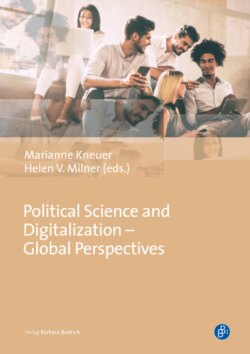Читать книгу Political Science and Digitalization - Global Perspectives - Группа авторов - Страница 36
На сайте Литреса книга снята с продажи.
3.3 Desiderata: risks and perspectives
ОглавлениеThis desiderata section discusses risks and perspectives for political science research in Mexico. Some of the risks are: 1. digitalization of content may occur in public universities faster than in private universities. 2. content of social sciences subjects will copy contents from other countries and adapt them to the Mexican reality; 3. the lack of funding for research will create a large delay in understanding the present reality.
What can be observed so far is that the digitalization of content – books, white papers, thesis, research projects – is mostly limited to public universities. This bases on a national public policy to promote open access for research and knowledge sponsoring online repositories for universities. On the contrary, private universities have to apply for this funding or develop their own repository. During 2017, 96 institutions achieved this funding in order to create an online repository (CONACYT 2017). Digitalization of contents in open access mode constitutes an important step to promote more digital education and digital research. In the case of social sciences, having access to books, research projects and thesis allows students and scholars to collect information and efficiently share knowledge.
The second risk is related to content production and sharing. Political sciences research in Mexico has enormous gaps to develop its own knowledge. Several reasons explain this problem: 1. the lack of an open political system that fosters democratic practices; 2. the absences of schools and universities with long tradition of research on theory and practice of social sciences; 3. the lack of scholars focusing exclusively on political science and not being embedded also in public administration; and 4. the lack of public policies with dedicated funding to promote research on this field.
These reasons justify the need to import knowledge from other countries, using their frameworks and theories to understand the Mexican reality. These foreign ideas imply the risk that they are not necessarily applicable to the Mexican political reality. Mexican political science has to develop its own research agenda, based on our history, cultural heritage [51] and supported by different worldwide theoretical perspectives. The third risk lies in the lack of funding. Without a proper public policy that promotes the understanding of Mexican problems – social and political – for long term research projects, there will be no important contributions to the national field of research.
What are the perspectives? The digital transformation can foster the creation of research communities using Web 2.0 sharing knowledge and producing more research in this field. Aspects to be taken into consideration are the following:
• In order to promote teaching and research of digital issues in political science, it must divorce from public administration and promote schools and universities focusing on this topic;
• Promote more research centers focused on national problems related to political science using technology;
• Impulse sponsorship for new journals and publications that promote social sciences in digital contexts;
• Expand more research topics, not only those for electoral processes, focusing on open government, e-government, and open data;
• Use the CONACYT platforms for managing research and scholars to promote digital communities using digital technologies;
• Distribute research funding and topics in the country according to their location. For example, money for border issues or migration on the border states; dedicated research for cities in the most populated areas.
The risks and perspectives of the digital revolution in the Mexican political science field are complex. Many Mexican scholars are working to make these changes possible and promote the discipline in the political parties, media, and government in the near future.
